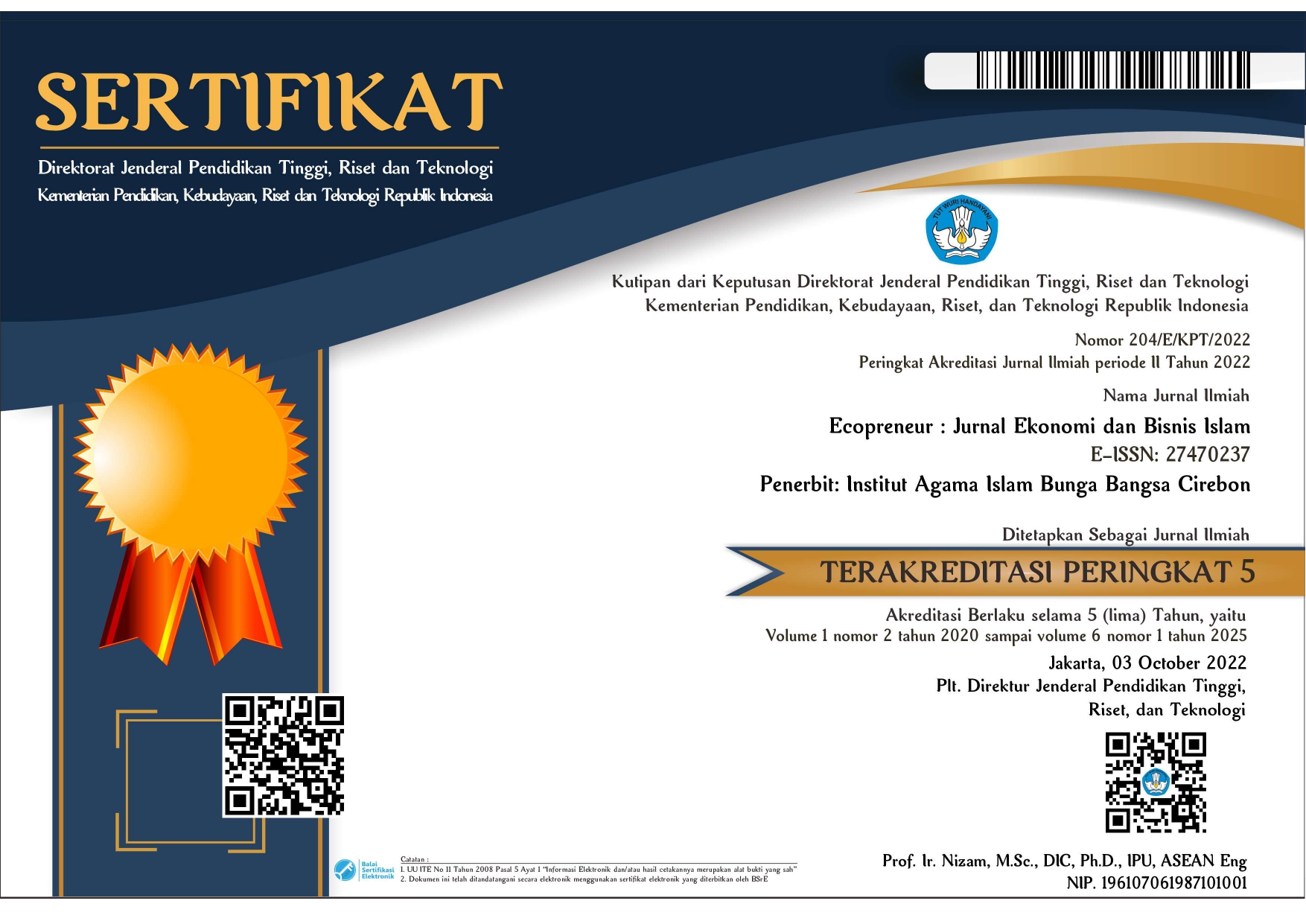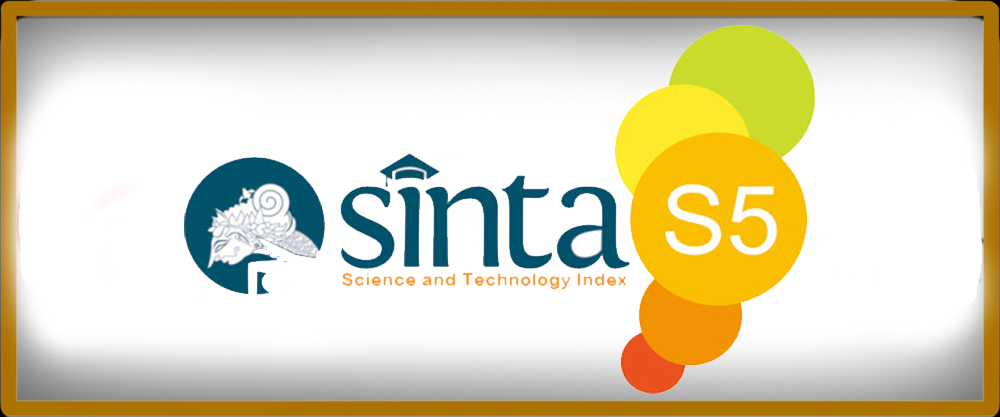Pendayagunaan Wakaf Di Wakaf Mandiri Pada Masa Pandemi Covid-19 Perspektif Maqashid Al-Syariah
Abstract
Abstract
The use of waqf instruments to solve social and economic problems provides an opportunity to deal with the Covid-19 pandemic. This article aims to analyze the use of waqf in Mandiri Waqf during the Covid-19 pandemic and its compatibility with the concept of maqashid sharia. The method used in this research is descriptive qualitative. The research was conducted by direct interviews with waqf institutions and supported by secondary data obtained from various sources. The results of the study show that in the perspective of maqashid sharia, the utilization of waqf in independent waqf is in line with the objective of waqf, namely that the principal assets of waqf must be maintained so that the benefits can be taken in the long term. The waqf program run by institutions during the pandemic can be divided into three according to the concept of the needs of Maqashid Syariah Imam As-Syatibi, namely dharuriyah, hajiyah, and tahsiniyah.
Keywords: Waqf utilization; Maqashid sharia; Pandemicontent
Abstrak
Pemanfaatan instrumen wakaf untuk menyelesaikan permasalahan sosial dan ekonomi memberi peluang untuk menangani pandemi Covid-19. Artikel ini bertujuan menganalisis pemanfaatan wakaf di Wakaf Mandiri pada masa pandemi Covid-19 dan kesesuaiannya dengan konsep maqashid syariah. Metode yang digunakan dalam penelitian ini adalah kualitatif deskriptif. Penelitian dilakukan dengan wawancara langsung kepada pihak lembaga wakaf serta didukung data sekunder yang diperoleh dari berbagai sumber. Hasil penelitian menunjukkan bahwa dalam perspektif maqashid syariah, pendayagunaan wakaf di Wakaf Mandiri telah sesuai dengan tujuan wakaf yakni dimana harta pokok wakaf harus dijaga agar dapat diambil manfaatnya dalam jangka panjang. Program wakaf yang dijalankan oleh lembaga pada masa pandemi dapat dibagi menjadi tiga sesuai konsep kebutuhan pada Maqashid Syariah Imam As-Syatibi, yaitu dharuriyah, hajiyah, dan tahsiniyah.
Kata Kunci: Pendayagunaan Wakaf; Maqashid Al-Syariah; Pandemi
Downloads
References
Khozin, A. A., Pratama, F. A., Ridwan, M., Amin, N. M. F., & Lesmana, T. (2022). Inflation and the Stability of Islamic Finance. ICOBBA_2021, 404-409.
Marleni, E., Mustoip, S., & Sulkhah, S. (2024). Implementation of the Literacy Movement in Shaping Student Character in Elementary School. EduBase: Journal of Basic Education, 5(2), 120-130.
Munajim, A., Pratama, F. A., Ridwan, M., & Rohimah, I. (2022). The Operations of the Bank Wakaf Micro Indonesia with the Scheme for the Economic Empowerment of the People. ICOBBA_2021, 1-6.
Nasir, A., Busthomi, A. O., & Rismaya, E. (2022). Shariah Tourism Based on Local Wisdom: Religious, Income, Motivation, Demand and Value of Willingness to Pay (WTP). International Journal Of Social Science And Human Research, 5(08), 3811-3816.
Pratama, F. A., Ridwan, M., Yulianti, N., Ratnawati, R., Maulana, A., & Masitoh, S. I. (2022). Implementasi Persamaan Fungsi Non Linier Dalam Matematika Bisnis Pada Kehidupan Sehari-Hari. Change Think Journal, 1(03), 289-299.
Pratama, G. (2022). Comparative Study of The Empowerment of Zakat BAZNAS Indonesia and PPZ Malaysia. ICOBBA_2021, 212-216.
Putri, Y. D. S., Mustoip, S., Nisa, D. H., & Ramadhani, N. U. (2024). Implementation of Audiolingual Methods in Understanding Arabic Color Concepts in Class I SDIT Alif Mardiyah. JPS: Journal of Primary School, 1(2), 1-6.
Ridwan, M., Motik, D. P., & Nurwahid, H. I. (2022). Afzalur Rahman's Thinking Concept: Relevance with Worker Ethics According to Global Standards. ICOBBA_2021, 322-329.
Selasi, D., Agustiani, L. R., & Vidiati, C. (2022). Upaya Mengubah Pendapatan Usaha Mikro Kecil Menengah (UMKM) Melalui Digital Marketing. Jurnal Multidisiplin Madani, 2(3), 1247-1258.
Selasi, D., Munajim, A., & Komala, S. I. (2022). The Digitization of Islamic Philanthrophy In the Islamic Capital Market in Indonesia. ICOBBA_2021, 166-174.
Selasi, D., Munajim, A., & Komala, S. I. (2022). The Digitization of Islamic Philanthrophy In the Islamic Capital Market in Indonesia. ICOBBA_2021, 166-174.
Selasi, D., Muzayyanah, M., Tatmimah, I., Sari, F., & Indriyani, R. (2022). Contribution of Islamic Capital Market to National Capital Market. INCOME: Innovation of Economics and Management, 2(1), 1-7.
Selasi, D., Vidiati, C., & Munajim, A. (2022). Pertumbuhan Bank Syariah di ASEAN: Dalam Sejarah The Growth of Islamic Banks in ASEAN: In History. Ecobankers: Journal of Economy and Banking, 3(2), 157-171.
Selasi, D., Vidiati, C., & Munajim, A. (2022). Pertumbuhan Bank Syariah di ASEAN: Dalam Sejarah The Growth of Islamic Banks in ASEAN: In History. Ecobankers: Journal of Economy and Banking, 3(2), 157-171.
Selasi, D., Vidiati, C., & Sumarno, S. (2022). Pasar Menabung Saham Pada Pasar Modal Indonesia. Ecopreneur: Jurnal Ekonomi dan Bisnis Islam, 3(1), 68-77.
Selasi, D., Vidiati, C., & Tardjono, T. (2022). Sharia Capital Market: Securities Fatwa, Derivative Securities and Mechanisms. IJOBBA: International Journal of Bunga Bangsa Cirebon, 1(1), 1-24.
Selasi, D., Virdiati, C., Munajim, A., & Sujata, T. (2022). Kesejahteraan Masyarakat: Analisa Kualitatif Sistem Keuangan Komersial Islam-SIstem Keuangan Sosial Islam di Indonesia.
Stefanus, S., & Ridwan, M. (2022). Analisis Strategi Marketing Syariah Untuk Meningkatkan Omset Penjualan Pada Era Globalisasi Di Toko Emas Pantes Sindang Laut Kabupaten Cirebon. Change Think Journal, 1(01), 87-95.
Vidiati, C., Al-Ghozali, M. I., Faturrizky, I., Selasi, D., Munajim, A., & Tardjono, T. (2022). Effects of the Money Market and the Need for Knowledge of Interest Rates and the Foreign Exchange Market for Benefit: Evidence In Indonesia. IJOBBA: International Journal of Bunga Bangsa Cirebon, 1(1), 37-60.
Vidiati, C., Hendra, E., Selasi, D., & Sumarno, S. (2022). Menilik Tas’ ir Keadilan dan Maslahah. Ecopreneur: Jurnal Ekonomi dan Bisnis Islam, 3(1), 78-92.
Wartoyo, W., Haida, N., Mujab, S., & Umam, M. K. (2022). Sharia Marketing Model Pada Bisnis Laundry Syariah (Case Study Pada Zada Laundry Syariah Sumber Cirebon). PROFIT: Jurnal Kajian Ekonomi Dan Perbankan Syariah, 6(1).












